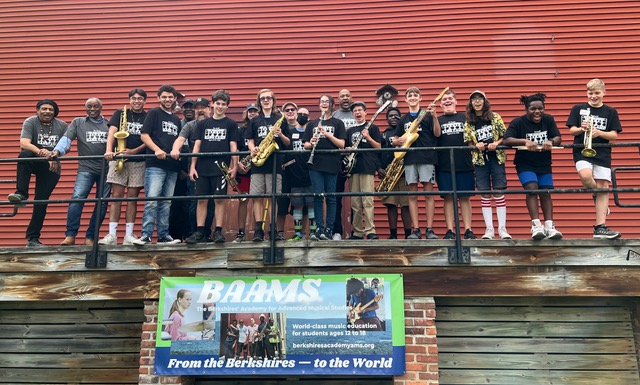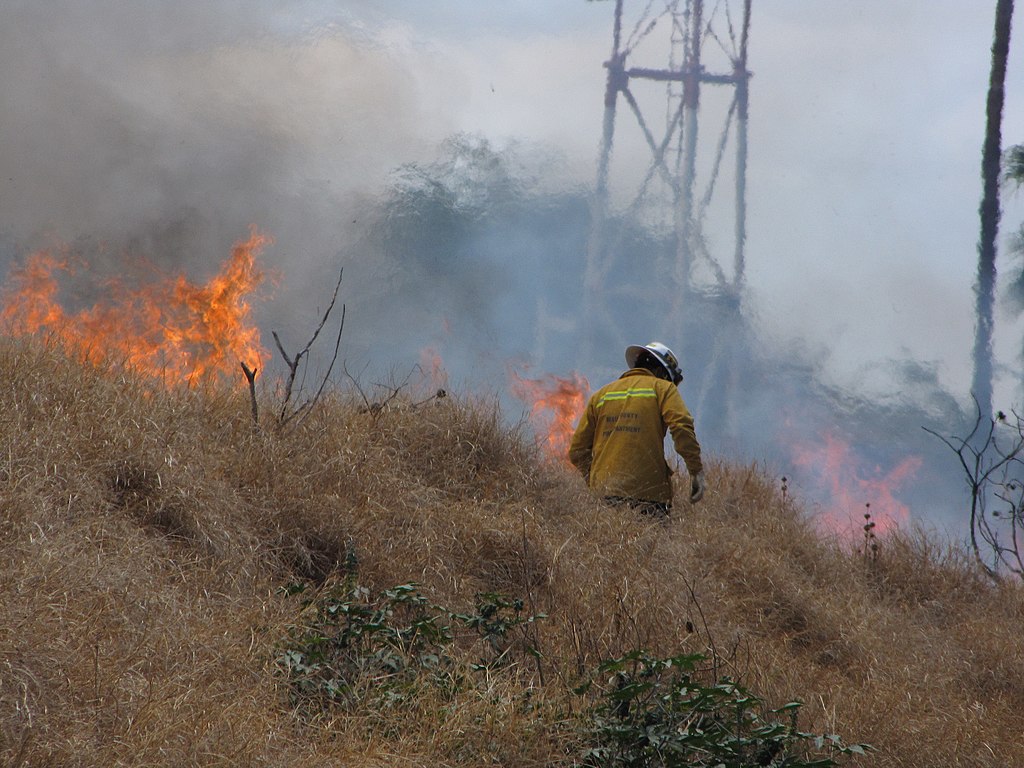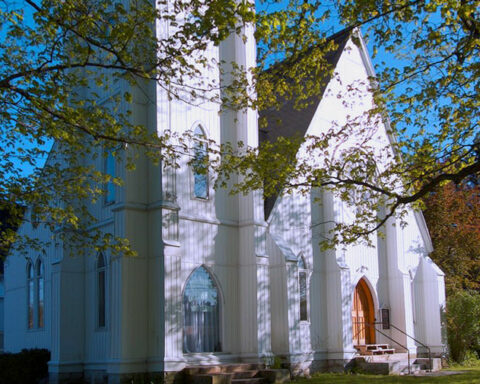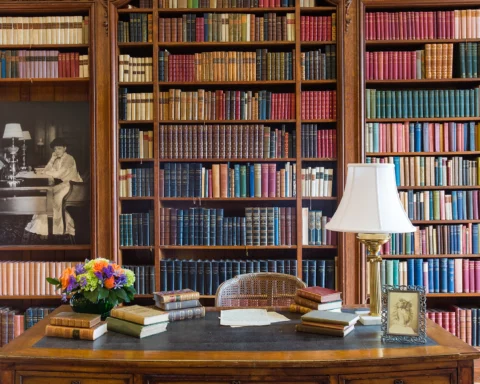Podcast (top-left-corner): Play in new window | Download
Berkshires Academy for Advanced Musical Studies raising the bar as it raises operating funds
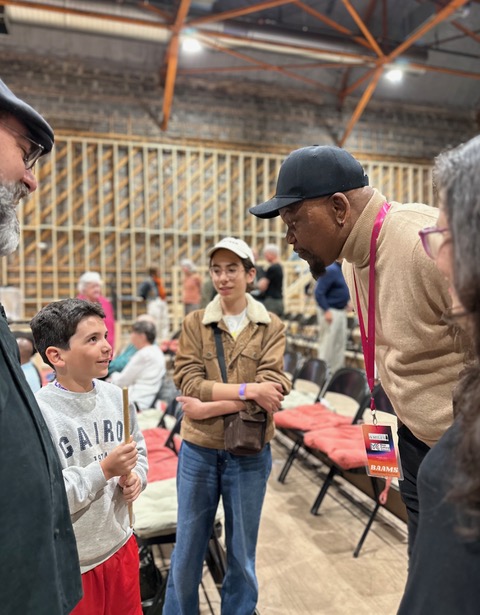
Jay Velázquez: This is the Top Left Corner. You’re listening to episode number 182. I’m your host, Jay Velázquez. And this episode dropped Thursday, August 10th, 2023. Sometimes the content is evergreen, sometimes it’s time sensitive. In this case, it is time sensitive. And that topic is the Berkshires Academy for Advanced Musical Studies, located at Building 6 Furnace Street and Heritage State Park, North Adams, Mass. I’m going to be speaking today with two people who provide a lot of the driving force behind this this initiative, which is now in its third year. I thought it was two years that they’ve been around, but turns out it’s three. Amazing how time flies when you’re. In a pandemic. And it’s hard to even count the days. We’re going to be speaking with Richard Boulger, founder and executive director, and Jane Forrestal, director of development and communications. They’re going to be talking about all sorts of things under the sun having to do with the last few years and the successes that they’ve had. And they did. I think Jane sent me a some follow up information that we just couldn’t cram into the half an hour or so that we talked. I’ll try to tack that on at the end because it doesn’t make any some of it won’t make any sense until you’ve heard the rest of the show.
Jay Velázquez: But before we even say anything, I do want to make sure that you know that there there are some great events coming up at. Well, not at but in connection with Bams. And they’re going to be fund raising events that would be great, whether they were fund raisers or not. So the first one is going to be jazz duo Charles Blenzig and Richard Boulger teaming up at Studio nine, which is a just an amazing audio space at porches in North Adams. And then on Wednesday the 16th, there’ll be a faculty performance at Mingo’s Sports Bar and Grill on 41 Roberts Drive, North Adams. You can see it right there off Route two as you drive by. So those two events, I’m going to put links to them in the show notes. Links to everything you need to know in the show notes. But for now, let’s get to that conversation I had with Richard and Jane.
IMPORTANT LINKS
Events
August 14 @ 7:00 pm – 10:00 p.m.
Jazz Duo Charles Blenzig and Richard Boulger
August 16 @ 6:30 pm – 9:00 pm
BAAMS’ Faculty Performance
Program Registration
• BAAMS Summer camp registration — a few spots left!
berkshiresacademyams.org/berkshires-summer-jazz-day-camp
• Fall registration to study after school and on Saturdays
berkshiresacademyams.org/class-registration
Support BAAMS!
• Donate to BAAMS (it can be one-time or monthly).
berkshiresacademyams.org/giving
Alternatively, a check may be made out to:
BAAMS and mailed to:
529 Main Street
Williamstown, MA 01267
NTRVW: Jane Forrestal and Richard Boulger of BAAMS
(rough transcript)
Top Left Corner: And with me on the line this morning from the Berkshires Academy for Advanced Musical Studies is Jane Forrestal and Richard Boulger. Good morning to both of you.
Jane Forrestal: Good morning, Jason. Jason, Thanks for having me.
Top Left Corner: You’re very welcome. I’m glad to have you here. Thank you. We’ve spoken in the past a little bit about Bams as it’s affectionately known. But let’s let’s talk a little bit let’s get a little bit deeper into how things have gone since you’ve opened. It’s been, what, two years now?
Jane Forrestal: It’s actually been three years. We just passed our three year anniversary in the spring, but it’s been a year since we’ve moved into our new facility at Building 6 in the Heritage State Park, North Adams And I got to tell you, a lot has happened in that one year.
Top Left Corner: Well, let’s talk about it. It’s it’s been it’s been a very welcome addition to the Berkshires scene. I know that the Berkshires is has always been known for theater and museums, music less so, at least until fairly recently. What what were some of the triumphs? What were some of the challenges? Just getting the school opened?
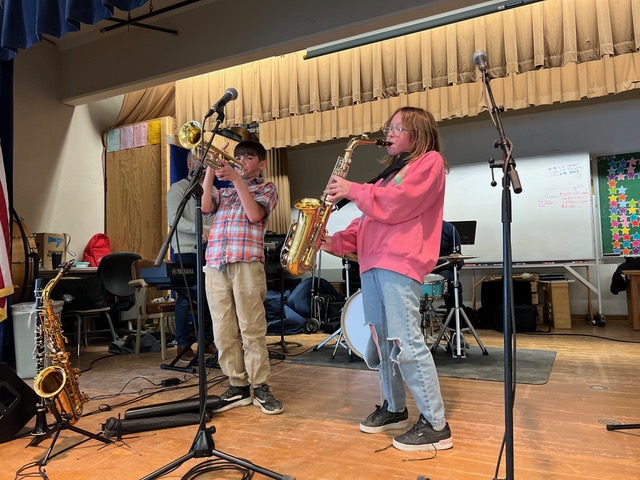
Jane Forrestal: Sure. Well, we moved into a building that had been empty and unused for quite a number of years. So there was a big cleanup push. We did a lot of painting and cosmetic work organizing. We were able to secure donations from various people and organizations. A couple of pianos, desks, chairs, etcetera. The essential items, file cabinets. And then we just simply opened our doors and began to operate. We had our first we had our fourth jazz band day camp in this facility last August. And now we’re about to have our fifth. And then through the school year, we taught lessons after school and on Saturdays throughout the school year from September through June.
Top Left Corner: Wow. What were some of the real, maybe unforeseen challenges that you that you faced getting the school up and running?
Jane Forrestal: Well, obviously, there’s there are start up costs with any any venture, any business like this. And when you take on a building, you also take on a huge liability and renters policy things that you have to budget in for electricity and heat. Et cetera. We installed a security system. Let’s see. You know, it’s everything imaginable that anybody deals with when you when you open a sort of school building. We also encountered, you know, the unexpected things like freezing pipes and things like that. But, you know, you cope with it and you move ahead and everybody’s been great. We’ve had a tremendous amount of help. We’re just so thankful to be here. The nice thing about this location, Jason, for people who have not been to Heritage Park, is that we have all of our own free parking. It’s private. We’re at the very end of the park just at the end where the pedestrian footbridge drops off, right? And we’re in downtown North Adams so we can see the back of City Hall and Hotel down Street. It’s a great location.
Top Left Corner: Now, the question I have, too, is what about neighbors? I know that some venues face challenges in that neighbors want to ensure that they don’t have an increase in volume of sound. Do you have neighbors close by and have you or did you have to do anything to sort of mitigate that?

Jane Forrestal: No. Interestingly, yes, we do have neighbors very close by and everybody’s been so welcoming and we haven’t heard we’ve heard not a word of complaint. And actually, this building used to be Berkshire Community Television Station. So I have a feeling that noise was always a factor in its operation before. And to be honest, we just we haven’t heard a word from anybody but positive feedback.
Top Left Corner: Well, that’s great. I know that a lot of the community has really been pleased to see that you’ve moved in there because there’s been how do I say this delicately? It has not been the sort of cultural. In a springboard that people have wanted it to be. I know there were some plans to have other things go into into the Heritage Gateway Park there. And this this means that really that facility is is in keeping with with its intended use to be a community of benefit. Richard, let me talk to you a little bit about the opening here. You have you you’re a musician. What what was your experience getting the show on the road for a place like this? Had you ever undertaken any projects of this nature?
Richard Boulger: Sure, Jason; prior to coming back home to North Adams, I spent, goodness, 20 plus years working primarily in New York City, in Brooklyn, close to 30 public schools in underserved neighborhoods, if you will. Very challenging dynamics. A lot of the kids, when we would show up, didn’t even have musical instruments. So for me, a lot of these kids were in gangs. We got them out of gangs. We introduced them to playing instrumental music. And over a period of six months to a year, you’d see dramatic changes in the kids, not only musically, but how they would perceive themselves and go back into their communities. And so building on that success and coming back home, it was sort of a, you know, the thing about what we’re doing here at BAAMS, there’s no cookie cutter approach to working with students. Every one of our kids is is unique and has its her or his own way of learning.
Richard Boulger: So the challenge is always to to tap into their kind of get to know them and what makes them tick. And one of the first questions I always ask all of our young students is what type of music? What kind of music are you listening to right now? Sometimes there’s a, Oh, it’s a jazz academy. No, we we teach music and that means all types of music. So tapping into our young people and really finding out what makes them tick is a big part of what we’re doing here. I’m not sure. I may have drifted off topic a little bit, but that’s really what’s the driving force, you know, years of working in with young people and seeing the success. For me personally, I was very fortunate to study with two masters, Freddie Hubbard and Donald Byrd. And they really gave me a lot of insight. And I’ve developed a a teaching process, the learning process that really seems to help young people have success doing.
Top Left Corner: Describe that process for just a bit because I know that I’m not familiar with it.
Richard Boulger: Sure. Well, the first thing is that we start with the premise that each of our students, that the musical instrument, whatever you have in your hands, whether it’s a flute, a trumpet, a guitar, the drums or a kazoo, it doesn’t really matter. It’s really just an amplifier of what they are hearing, what they’re thinking and ultimately what they’re feeling. So I’ve developed a series of exercises that really always say it all begins with a single note. So we literally start with one pitch, one note, one sound, and have that student match that sound. So we’re not from day one, we don’t have kids staring at a music stand or reading out of a book. We empower them that the music, the source of the sound ultimately comes from within themselves. So it really is from that one, just all these different exercises help them to develop the skill. And after a series of months in this past year here at BAAMS, we’ve had six of our students create record, compose record and now have finished product of original songs. So, you know, we’ve got kids that are ten, 11, 12, 13, 14 years old who all are now creating their own original music. So that’s just a small look into this process. But it is a whole process where we can literally start with someone who really doesn’t have much of a background in music per se. Give them the tools and then let them develop at a pace and ultimately to help them who they are becomes, you know, express that through music.
Top Left Corner: In the setting that you’ve got in North Adams, How many students do you typically have? How many do they work together in groups? Is there like a one culminating project that everyone participates in, or is it individually based? How do what’s the experience like for the students? And and just more generally, what is the experience like for the students who who sign up?
Jane Forrestal: So we typically have through the week, you know, around 20 students week in and week out, the Saturday Ensemble Group is between 6 and 8 students, depending on who’s enrolled and who’s around at the time. We’ve also brought our faculty into area public schools, and that has resulted in us being able to reach many, many more students, probably upwards of 60 to 70. And the stars residencies that we held this past April did culminate in a final performance, a celebratory performance on that final day, which was attended by lots of families and city officials and area folks who were interested to see what we what we do in terms of the typical day, the the way a student enrolls is they sometimes parents will call. They have questions they want to know answers to before they enroll their children. And then other times we just simply receive a registration online and then they come. Usually there’s an individual meeting so that Mr. B Richard can get to know the students and their interests and their experience, background and what they’d like to get out of learning from, from bands. And then we just move forward. It’s a pretty simple process what we have developed because as you can imagine with our being a young, relatively new nonprofit organization founded in the middle of the pandemic, our funding is not huge and we cannot afford expensive advertising. So all of our students seem to come to us through word of mouth, which is a great thing, which means they’re very informed about who we are and they come through the door hungry for for what they can learn here at bands.
Top Left Corner: That is a really great that’s a really great picture of, of what must I’m sure by the end of the experience feel like a community even a family of musicians. I know that there’s something about performing music together. I’ve been in a number of bands when I was younger and when I was even younger than that, I was in concert choir. So I get the the experience of of creating sound together. It does something to to bring people together. That is, it’s I call it a bio magical because it resonates literally with the with with the flesh, with the bones within us. And it also resonates emotionally, mentally. What do you hope? Aside from just the musical musical skill, what do you hope that students come away from BAAMS with?
Jane Forrestal: Well. I’d ask Richard to chime in in a moment, but I just want to say one of the things that I noticed is there’s a combination of, number one, having a lot of fun. There’s a lot of laughter and humor, but also a strong focus on learning the foundations, the fundamentals. And then just encouraging freedom. And so by doing that, students are learning how to recognize what they’re interested in, what sounds they want to make, what rhythms they’re interested in, what they want to communicate through their music, and then learning to advocate for it. You’ll have a student who is who is confident enough to say, No, no, no, that’s not what I wanted. This is what I want, and here’s what it sounds like. So they begin to develop that that strong sense of of the the artist’s sense of themselves and mission and being able to advocate for their creativity, which will help them in whatever they do through the rest of their lives. But if let’s get some comment from Richard.
Richard Boulger: Well, yeah, building on what Jane said, very well. I would say another thing that we really love to do here, and we do do this by design is we always ask a lot of questions, a sort of Socratic method, if you will. And in that we, for instance, how was your day? And we’ll ask our students and they’ll raise their hands and give us brief explanations. It was whatever it was. The question is then, well, what does that sound like? You know? And so what does sadness sound like? What does Joy sound like? So we’re taking the student’s experiences in their lives and we’re giving them an outlet to express these these these experiences. And I think that’s really I love how you use that phrase bio magical. I think that’s very hip. And I think that’s we sort of have that in the air here at BAAMS. There’s a certain for the upper it’s an example like the upcoming jazz camp coming up this next week, August 14th to the 18th. There’s a certain unknown factor here for us. We’ve got yes, we’ve got incredible artists coming up, faculty to teach. We’ve got a rough blueprint of what we’re going to be working on. But in this course of this week, we’ll probably have 3 or 4 original songs that will be created by the kids interacting and playing with each other in the moment. So that’s I love that. Again, that bio magical dynamic.
Top Left Corner: Anytime you want, you can use that word not trademarked yet. Let’s talk about some of the there’s a lot of output. I mean, what I’m hearing is there’s a lot of energy, there’s a lot of product, there’s a lot of creativity that puts out from the school. And I’m guessing that that requires a lot of inputs as well, inputs of time and talent, obviously. But this can’t be a this cannot be a cheap endeavor that you that you’ve set upon. You said you’re a nonprofit organization. I’m guessing that the cost of of tuition, the cost of attendance does not cover all of your operating costs.
Jane Forrestal: Well, right. It’s like any other nonprofit. I mean, certainly the operations if you were to go to Mass MoCA and pay your entry fee and tally up everybody who visits the museum and numbering in hundreds and thousands, it doesn’t begin to cover the expense of organizations like ours here at BAAMS either. And so we do work 12 months a year, sometimes seven days a week, to garner support through donations.
Jane Forrestal: They can be anything from $25 to $2500 to grants, to business sponsorships. And we do collect tuition. Of course, when families can afford to pay. But our tuition is already reduced to an affordable rate. We don’t want one of the first things that the kids do, they grow up pretty fast and they know what their economic their own economic picture is. And children will ask right away how much does it cost? And they’ll calculate whether or not their family can afford it. And they’ll they’ll back themselves out of an idea right away if they think it’s not within reach. So we try to communicate with folks that will do everything in our power to help them meet the cost of tuition. And we also have had this is one of the very nice things we’ve had recently is there are other charitable civic organizations who have said to us, if you have students who can’t afford the tuition, send them our way and we’ll just ask them to provide a little bit of information and we’ll cover it. So there’s a there’s a number of ways that that this can be handled, but there’s also planning for the future. Jason And we are we are in high fundraising mode right now to look for some large dollar donors to begin to build our coffers to weather those those frozen pipe situations and other things that come up and also be able to buy equipment, make improvements to the building, perhaps do some advertising, etcetera, and get all of our staff paid, which as you can imagine, sometimes you can go a long time with no paycheck or in-between paychecks.
Top Left Corner: Sounds like you might as well work for a local news organization. It’s about as lucrative, Right. But the the the work is important. And, you know, exposing more kids to not just musical creation, but but also performance, because performance, I think is is really helpful in developing self confidence and a certain composure that you don’t get in too many other places. Maybe public speaking is one, but to perform in front of people and to hear applause especially, it does something it lasts a lot longer than than just the houselights going down. It can send a kid on a different trajectory. Even so, I know that this work is critically important. You have some, some you’ve got. Well, first of all, you’ve got benefit concerts coming up now the next couple of well, I guess really the next week. What what do you have coming up that people can not just go and feel like they’ve helped but also go and really dig it because you’ve got some some big names here?
Jane Forrestal: Sure. Sure we have. Because all the musicians are in town teaching at the camp. We try to make part of our mission here at bands is to provide cultural and musical events for the public to hear and attend at either no or reasonable cost. So fulfilling that mission we have Monday night will be at Studio nine at the Porches Inn on River Street in North Adams, which if you’ve ever been inside of it, is absolutely gorgeous. Acoustically pure space. We’ll have jazz piano from Charles Blenzig and of course, Richard Boulger on trumpet. They’re going to do some jazz duo work in the beginning of that show. And then they’ll be joined by Alex Blake on bass and Tony Lewis on drums. That will be a phenomenal show. That’s $20 at the door. And then we’ve got Wednesday night in the tent outside, very festive atmosphere. So much fun to perform. The whole band will be there Wednesday, August 16th, and that’s coming right up. That is a free admission event with donations suggested to bands. All proceeds go to supporting our programing here at the music Academy. Now with that said, we also have the culmination of the entire camp five days on that Friday night. We always have the Friday night gala, which is simply the students and the faculty perform together.
Jane Forrestal: It’s a rousing show. Audiences are just wowed by it. And in all these instances, what we what we find is people just they’re like, I can’t believe it. I had no idea. I didn’t know that you guys did this. And and it’s a lot of fun. So it’s a great way to also reach. Larger audiences. Sometimes you have people find out about us through those events and suddenly you’ve got a new student coming through the door. We recently performed during the 4th of July Parade. At the end of the parade at the bottom of Spring Street. We had the opportunity to perform for crowds there. This past July 4th. It was so much fun and people were coming up to me and saying, When’s your next gig? And handing me $20 bills and saying, I love what you’re doing. Thank you so much. So it is very uplifting. We do have kids that say, Oh, I wish my parents will say I wish my four year old were old enough to come to BAAMS. So I say, hang in there. Just come knock on our door in a few years and we’ll welcome you in.
Top Left Corner: It’s so good to hear that the community has been supportive. And you know, a lot of it, too, is time, right? I mean, it’s getting the word out over consistently over time so that people they they are aware of what you’re doing and have been exposed to what you’re doing. It’s one thing to know that you exist. But then, as I said, to hear it and to maybe experience some of that bio magic because, you know, the audience gets gets pounded with with the full force of creativity and and and and especially youthful performance vigor. I think that you can’t really. Walk away without. Without. Feeling like the world is a better place for an organization that molds minds, molds, hearts. It’s been a delight to hear people talk about what you’re doing over there. So one of the things that I’m wondering about is. It’s a busy summer. The Berkshires is always, always, always jam packed. And there’s a lot of people doing fundraising now to other organizations. Let’s say that somebody’s got their calendar already booked for next week. They can’t make it to the shows. How can people contribute? Even if they can’t be there in person.
Jane Forrestal: Sure. Sure. Well, if you go to our website. I’m not sure if you’re able to put that up for folks, but if you go to our website. Which is BerkshiresAcademyAMS.Org. We do have a donate button right on there which allows people to make an online donation. You can also write a check and mail it. Make it out to be a m as in Mary S, as in Sam, and mail it to our corporate offices, which is 529 Main Street, Williamstown, Massachusetts. 01267. And then there’s also a conversation. Some people want to become more involved. Some folks, by the way, the option with the online donation. We recently had someone set up a monthly payment. So they’re sending in a small monthly payment each month, which is going to be a huge help. So there’s all kinds of ways to make a difference.
Top Left Corner: Yeah. I was going to say, the sustaining members, they can really become the backbone of support that you need to keep going. As you said, there’s always those and we hate to even, you know, raise the specter of them, but there’s always those frozen pipe moments and you do want to have a bit of a war chest to deal with them so that you don’t have to reach out. You know, on the spot at the moment and saying, hell, because that’s that’s never easy to to be fundraising and fixing the problem at the same time. Um, you know what? I would love to, to see, you know, YouTube has a there’s this I guess it’s an integration that’s built in there called Super Chat. And I haven’t used it, but I’ve seen it when I’ve been looking at various, you know, shows on YouTube where people can donate as the as the whatever the content is, is going on, is being performed or being done. I would love to see maybe not this year, but some year where you can broadcast performances and get them out to a potentially global audience so that people can actually just hit the donate button on the super chat as they’re listening.
Jane Forrestal: That’s a great idea, Jason We actually we admired so much when Questlove did that for the fundraiser for the middle school in Pittsfield, when he did his broadcast, he made a like a rent rent party. The students down there were learning about that. And I think he made in in under two hours. He earned $5,000 for that school for their their elementary jazz program, which is very impressive. We have had some live stream events. We’ve rebroadcast events and we’d like to do that further. So I think that’s a terrific idea. The other thing that we have found is really helpful is partnering with other organizations. There’s there seem to be logical partnerships that crop up and people willing to work together and they share the same vision. And recently we held our third anniversary benefit concert in Adams with the Adams Theater back in May. At the end of May, it was it was a huge success. We were able to hold a VIP event prior to the concert. Then General Admission folks came in and they their tickets were very affordable between 20 and $40 to see not only the musicians. We had a seven member band playing all of our faculty and a few other additions and we had special guests, some students, one student played and we had a live painting experience going on in the second half of the show, and those paintings are for sale. We had the artist Tom Reyes of Visible Sound come from Tokyo.
Top Left Corner: So cool. Now I a lot of people don’t know this, but I also run radio free berkshires.com which is a 24 hour seven day a week streaming radio station. So perhaps one day radio free Berkshires can team up with BAAMS to do some some live broadcast some streams not broadcast, but streams right from the comfort of people’s own couches, iPhones, whatever. We’ll have to talk about that in the future. Well, let’s let’s do this. I’ve got to I’ve got the information that I’m going to share. The the links will be in the show notes. The address for people to send in a check will be in the show notes. Do you have any more room in this in this season for more campers or are you are you booked.
Richard Boulger: We we’ve got a few more slots still open. We’re at 30 campers jazz students for this next the upcoming jazz camp. But we we’ve got a few more slots.
Jane Forrestal: And we’re looking for bass players.
Richard Boulger: Yeah. Imagine the chance to study with the great Alex Blake which he just a huge opportunity and certainly transformational. So we do have a few more openings if folks want to come on check us out on our website. They can sign up and go through that process. I would like to say one more thing that’s really special about this year’s camp, and that would be that this is the first year that we are now having two of our graduates from previous camps and from bands, if you will. They’re both now freshly just finished their freshman years and studying music at their colleges of choice. And now they are coming back to work with the faculty as apprentices. So they’ll be working with us. So it’s so important that we have this connection generationally. So you have a master drummer, Tony Lewis, working with one of our recent graduates will be an apprentice and he in turn will be working to help Tony to work with the young people who are just starting out. Some of our kids are 12 years old and just. Learning how to hold, just beginning to sit down at a drum drum kit. So the the passing of the torch for us is very, very important.
Top Left Corner: That is so astounding to hear. And that’s the way music is supposed to be, isn’t it? It’s supposed to be something that we share generationally. It’s supposed to be something that we give back. You know, and music is one of those things that you can do that with. There’s a lot of other professions that you don’t really get that chance to to perform your work together. I mean, you don’t see a lot of, you know, heart surgeons jumping in and working together on a on a patient generationally. But you do see people getting up there and wowing crowds. Do you do you think a lot of these young people, do they how many of them know? How rare of an opportunity that they have with working with some of these musicians. Do they do they do they get that in the beginning or do they just have to? Do they end up realizing that at the end or maybe not even?
Jane Forrestal: Well, we do, we do a little bit of our humble bragging, obviously, in our in our publicity. So there’s a clue there for people to follow up on. Some of that depends on the kid’s family. Sometimes their parents will recognize names and they’ll the students themselves, sometimes they’re very good researchers and they jump on the computer and do some Google searches to find out the bios and backgrounds of our faculty. But they do recognize it. Oftentimes we hear comments like, I can’t believe I get to study with so-and-so. I just had the we had one say thank you for giving our son the best week of his life. I mean, it’s just been it’s been a really great experience. And the reason why I personally feel it’s so important in this region is we don’t live near Boston. We don’t live near Albany, close enough to Albany, rather, or New York City, greater New York City, New Jersey area. We are here in the Northern Berkshires and we feel that students here deserve this type of education. Top tier musicians teaching young people who are motivated and interested. And what happens is.
Jane Forrestal: Suddenly you’ve got a population of kids who maybe really couldn’t compete for seats in music, music, schools and music colleges who who do have the experience under their belts, who when they put this on their college applications and on their resumes for experiences that they’ve had coming up in music, it’s very impressive. People recognize our name already. And further to that, we have students this summer. Of course, the majority come from this region, but we’re talking from Clarksburg to Lennox, but also beyond. We’ve got students coming from Binghamton, New York, Providence, Rhode Island, Cambridge, Mass. So word is spreading.
Top Left Corner: Yeah, you bring up a really good point. There are there are historically, there are some sort of centers, cultural centers when it comes to music that that give young people more exposure. And what you’re doing is is something that North Adams has not had, this region hasn’t had. And also just giving young people the idea that it’s possible. Right. I mean, that a career in music is, you know, it’s not going to be easy. And it might you might not be we might not all grow up to be Taylor Swift, but we can grow up and we can it can be a realistic prospect for us. And to have been involved in a program like this makes you think, yeah, yeah, I can do that. And and that’s that is. Well, you’re basically paving the way to some some of these young people’s dreams, which is you can’t really put a price tag on that.
Top Left Corner: But people can certainly go to the website and put their own personal price tag on how much they can help make this happen, how much they can help it continue to grow. And as you said, get the word spread. When I used to work for Shakespeare & Company and turns out there was this one family and they were there from I think it was Belgium or no, the Netherlands. They used to come to Lenox every year just because they wanted their kids to do the theater programs at Shakespeare & Company, so they would take. Yeah, I mean, they did this for like 12 years.
Jane Forrestal: I believe it. I believe it as a swim team parent. I spent 11 years traveling to pools around New England. But, you know, it’s exciting that, as I mentioned, we have students coming from far away and so on and so forth. But as you’ve mentioned in our conversation, we’re all here together in this space at this one time, and it’s magical. Each year there will never be another fifth Berkshires Summer jazz band day camp ever again. It’s one time the people who are in the room are the people who are in the room and incredible stuff can really come of it. I’m so excited for the coming week. We start off Monday morning and Friday night with our gala performance, which will be held this year because we’re not going to risk weather issues in the Church Street Center at MCLA starts about 6:30 p.m. and it’s going to be a fabulous show. You know, interested people from from the region should come on in and take a look at that. If they want to have a rollicking good time hearing the music and get to know.
Top Left Corner: Us well, we’re definitely going to get the word out here at The Greylock Glass. Jane, Richard, I thank you so much for the work that you do for the great effort that you put into really elevating music in this community, which is something that we’ve needed for a long time. And I just want to thank you for your generosity of time and and knowledge today.
Richard Boulger: Well well, Jason, we thank you so much for your continued conversation and support ongoing and we really do wish you all the best. And we hope that we invite everyone to come on down and join us at BAAMS. And, you know, they say if you build it, they will come. And we’re just going to keep going here with a big positive heart and lots of joy and positive vibrations in every way. We’re really looking forward to it.
Top Left Corner: All right. Well, we will talk to you soon, and I’m sure I will see you at at least one of these events this summer. Take care. You, too.
Jane Forrestal: All right, Jason, thank you, Jason.
Jay Velázquez: It really is just so exciting, isn’t it? This, this. This entity that sprung up seemingly out of nowhere. don’t really remember. Even hearing much about it too, too long before it happened. But it’s changing lives. It’s definitely changing lives. And think about and this is something we didn’t talk about in the show, but think about how we’re increasing the saturation level in the area of young people with serious musical chops that can only lead to good things in the future.
Jay Velázquez: Hopefully lots of garage bands popping up here and there. So some of the other items that Jane and Richard wanted you to know about are having to do with the building. They write that our space at Building 6 is also phenomenal and that it came to use fully handicapped, accessible no stairs inside the entire building only ramps with handrails two unisex handicapped restrooms, restrooms with grab bars and the rear double door entry is a ramp, which is very important. And that they can accommodate students with disabilities as well as visitors, grandparents, etcetera. And it also makes moving heavy equipment in and out much, much easier. Yeah, music is one of those sectors where you’ve got heavy equipment. Also, they mentioned that many of the jazz campers come back year after year. They have several veterans returning again next week. Jane says that that sense of community and even families really being built and over time, the mentoring relationships just get stronger and stronger. And we didn’t make this point in the show, but it’s it’s a day camp that they run at BAAMS not no overnights and they don’t serve meals. So if a student comes from a distance, they offer to help find accommodations for them.
Jay Velázquez: If there are any nearby. So those are things to take into consideration. Again, very important to remember that we’ve got these two great shows coming up in the next week, the first being the jazz duo Charles Blenzig and Richard Boulger at Studio nine at the Porches in downtown North Adams. That’s Monday the 14th, and then Wednesday, the 16th. BAAMS faculty performance at Mingo’s Sports Bar and Grill on Roberts Drive, just off Route two in North Adams. So do check those out. One of them, 20 bucks, the first one. The jazz duo, 20 bucks a head at the door. Great, great price for a great, great show. And the next one, as mentioned, is open. There’s no admission fee, but I’m sure the hat, the guitar case will be open and people are encouraged to drop, you know, big bills in there, you know, big denominations, 20 tens and and maybe even just whip out your checkbook and drop a nice fat check in there because this is an organization unlike any other in the Berkshires and they’re doing fantastic work and we really want to support them. Well, that’s our show for the day. I do thank you for tuning in, as always. Until next time, stay safe. Be good to each other and go easy on yourself. Take care.
